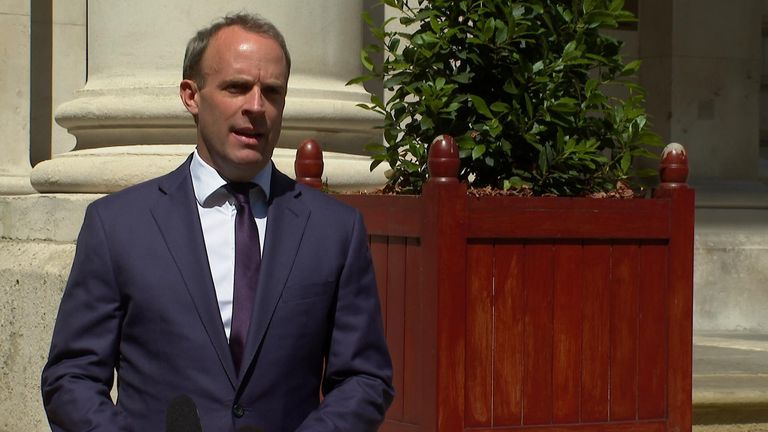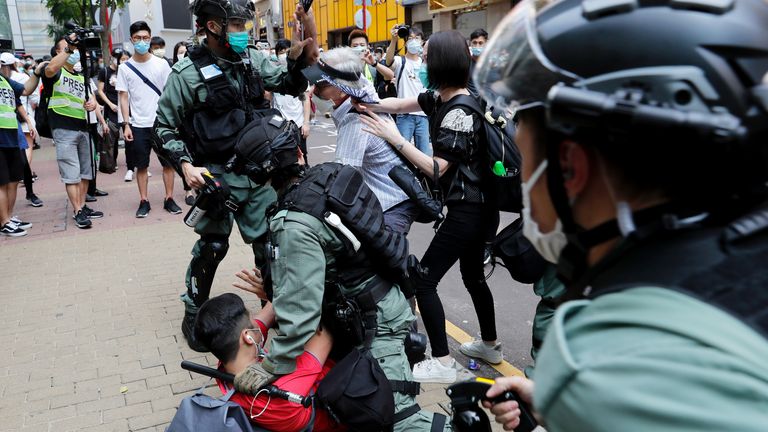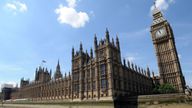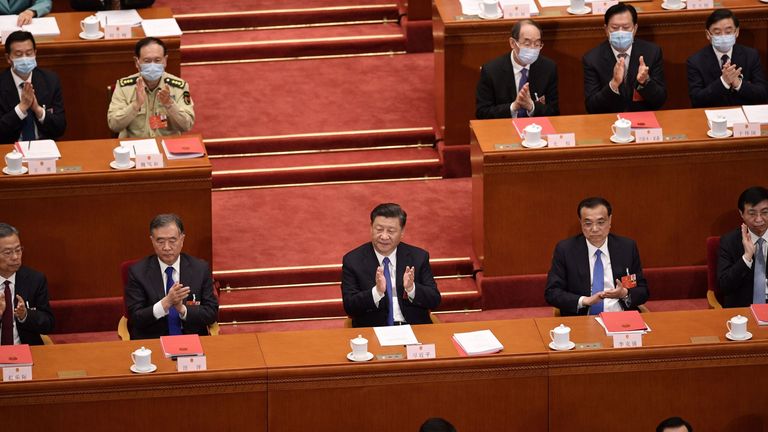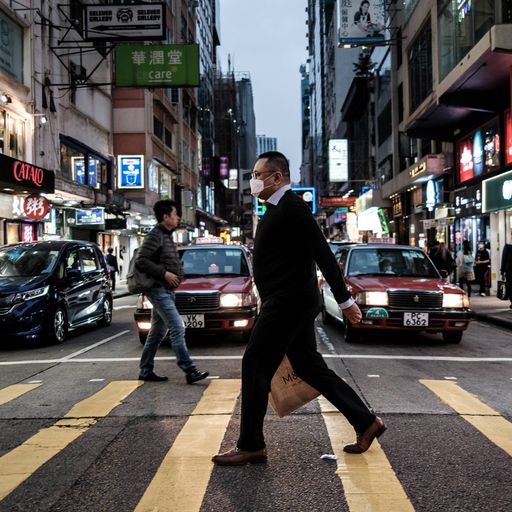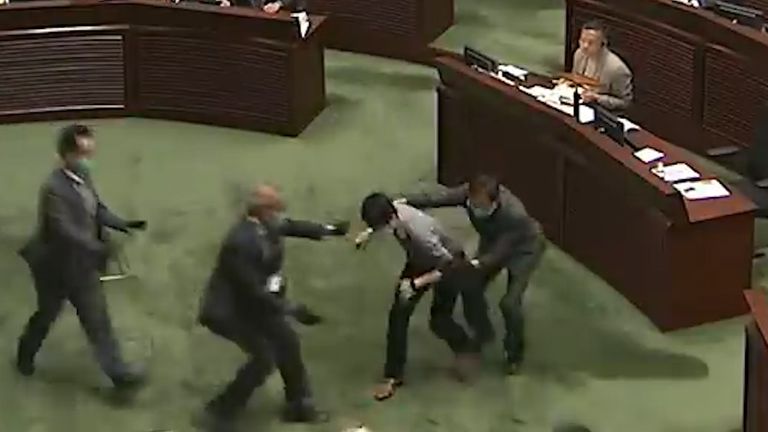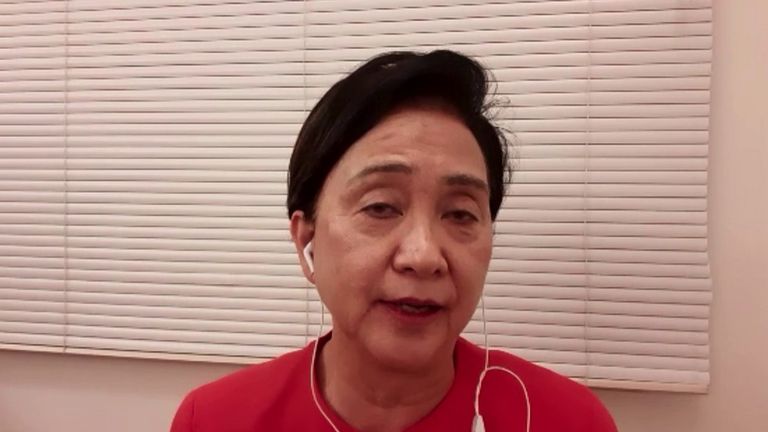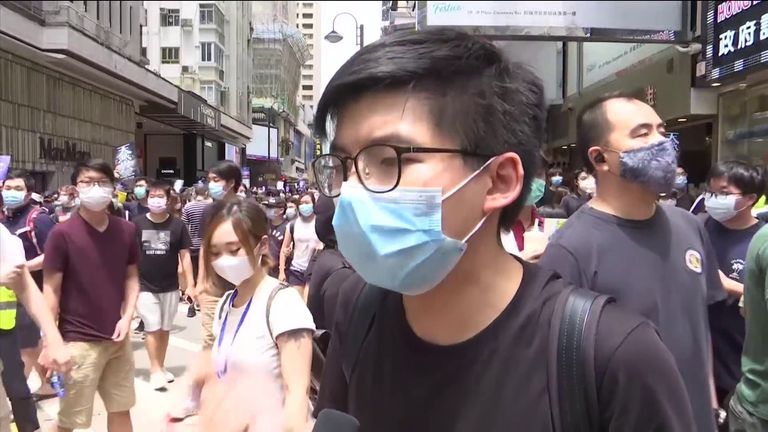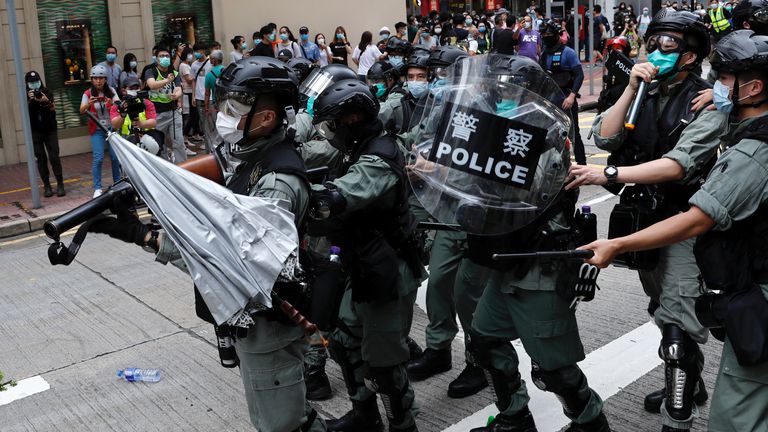UK vows to extend visa rights for Hong Kong citizens unless China drops security bill
Foreign Secretary Dominic Raab expressed "deep concern" over the bill and said it "violates" Hong Kong's autonomy.
Thursday 28 May 2020 18:19, UK
The UK will extend visa rights to as many as 300,000 Hong Kong citizens unless China drops its controversial security bill.
In a joint statement with the USA, Canada and Australia, Foreign Secretary Dominic Raab expressed "deep concern" over the proposed legislation that would allow China to set up intelligence bases in Hong Kong.
He promised to increase the amount of time Hong Kong British Nationals Overseas (BNO) passport holders can stay visa-free in the UK from six months to 12, with a possible "pathway" to becoming British citizens thereafter.
But this would only apply to the 300,000 residents who hold the special status passports and not the whole territory.
Mr Raab urged China to "step back from the brink and live up to its responsibilities as a leading member of the international community" by pulling the bill, which was formally endorsed by the People's National Congress in Beijing.
His joint statement said the law would "curtail people's liberties" and "dramatically erode Hong Kong's autonomy".
Amnesty International described China's actions as an "outrageous attack on human rights", with the charity's UK director Kate Allen warning the consequences will be "deeply unpleasant and felt for years to come".
The vote to pass the law overrides the authority of Hong Kong's Legislative Council, where efforts to push the bill through had been thwarted by public opposition.
Chinese officials will now draft details of the new law, which it is believed will ban sedition - actions that encourage dissent against China's authorities.
Beijing says the legislation is aimed at tackling secession, subversion, terrorism and foreign interference.
Hong Kong's Beijing-backed leader, Carrie Lam, claimed in a statement welcoming the vote: "The law will not affect the rights and freedoms enjoyed by Hong Kong residents."
But campaigners in the city were despondent, with pro-democracy lawmaker Dennis Kwok telling reporters: "This is the death knell for Hong Kong, make no mistake of it, this is the end of 'one country, two systems' ... the Hong Kong that we loved, a free Hong Kong."
Thousands of people have already taken to the streets in anger, with demonstrators staying out late into the evening on Wednesday.
They believe it will undermine civil liberties and might be used to suppress political activity.
They were heard chanting for full democracy and for Hong Kong to seek independence from China, saying this is now "the only way out".
And it came against the backdrop of escalating threats from Washington, where Secretary of State Mike Pompeo said Hong Kong no longer qualified for special treatment under US law, potentially dealing a devastating blow to its status as a major financial hub.
He told Congress that China's plan to impose the new legislation was "only the latest in a series of actions that fundamentally undermine Hong Kong's autonomy and freedoms".
"No reasonable person can assert today that Hong Kong maintains a high degree of autonomy from China, given facts on the ground," he said.
China's new bill is expected to see Chinese intelligence agencies set up bases in the city, which was supposed to have a high degree of autonomy under the terms of its 1997 handover by former colonial power Britain.
Chinese authorities and the Beijing-backed government in Hong Kong insisted there is no threat to the city's high degree of autonomy and the new security law would be tightly focused.
The US and China clashed over Hong Kong at the United Nations on Wednesday after Beijing opposed a request by Washington for the Security Council to meet for discussions about the legislation.
The US mission to the UN said the issue was "a matter of urgent global concern that implicates international peace and security", while China said the legislation was an internal matter.
Analysis: Why this legislation was a huge surprise - and a massive accelerant
By Tom Cheshire, Asia Correspondent
Amid the pandemic, it's been much observed that history accelerates in crisis. Here in Beijing, years have been compressed into the last week, in terms of China, Hong Kong and the rest of the world.
On Friday, the National People's Congress proposed national security legislation to cover Hong Kong. It was a huge surprise - and a massive accelerant. Hong Kong's autonomy was supposed to last until 2047.
Beijing and Hong Kong insist that Hong Kong's freedoms will be preserved. The US disagrees. Mike Pompeo, the US Secretary of State, told Congress that "no reasonable person can assert today that Hong Kong maintains a high degree of autonomy from China, given the facts on the ground".
It's probable that the US will go on to impose sanctions - something unthinkable last year, even amid the heights of the Hong Kong protests and the heavy-handed police response. And US-China relations will reach their lowest ebb since the Korean War, nearly 70 years ago.
Why has so much happened, so quickly, in this case? The pandemic initially looked to be a threat to the Chinese Communist Party.
Instead, they contained it, at the same time as the West grimly tallied tens of thousands of deaths. Washington railed against Beijing - the same trajectory as pre-pandemic, but now with much more vigour and much higher stakes.
Beijing responded equally forcefully. It has always wanted to bring Hong Kong to heel but seemed to be happy to wait and, year by year, grip Hong Kong tighter.
The pandemic accelerated time, so China seized this moment now, and that has accelerated time once more.
Issues like Taiwan - and China's ultimate aim to "reunify" or in fact annexe it - seemed a generation in the future. Now they are conceivably short term.
Last year, protesters told me of their fear that, one day, Hong Kong would become "just another Chinese city". The US is now saying that this is exactly the case. "One day" has come very quickly for the people of Hong Kong.
